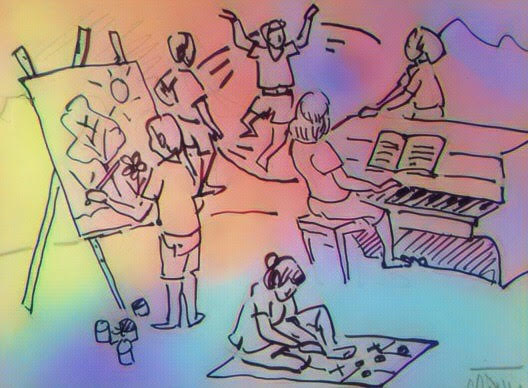 Society
Society

If somewhere on Earth there is a 101 guideline on being a good child, I think the first rule would be: “wear pink, you're a girl”, or “boys don’t cry”.

|
| Illustration by Đàm Minh Trí |
By Khoa Thư
Being a kid is easy.
You can think the way you want and act the way you want without fear or prejudice.
But still, not many kids enjoy the freedom they deserve at a young age.
There is always someone, probably your parents, telling you to act in a certain way because of your sex.
If somewhere on Earth there is a 101 guideline on being a good child, I think the first rule would be: “wear pink, you're a girl”, or “boys don’t cry”.
The perception of gender identity has been gradually shaped that way, simply by social norms that parents seem to absorb.
The concept of “normal” and “abnormal” in expressing oneself, therefore, has become bipolar.
For a girl, you should wear bright colours, take care of your Barbie dolls, and play cooking games.
For a boy, you should be energetic, Lego is your thing and never dare to cry loudly!
The world’s present population is 7.7 billion people. Is it fascinating for us to still easily portray others like this?
In Việt Nam, where adults are asked to “think outside the box” to head the emerging wave of innovation, it is strange for children to be prevented from simply being themselves.
As the age of 15, I witnessed a friend of mine being beaten by his classmates for being too “girly” in his nice bright chinos and staying indoors listening to music rather than playing football on summer days.
The hatred was so strong it manifested itself in fists hitting my friend’s face.
I wonder whether those bullies were forced by their parents to show their power, just to be considered real young men.
Hà Nội, where I current live, is the home of the country’s biggest annual rainbow parade – VietPride, when people come together to embrace diversity and freedom of expression.
Many children are brought by their parents to join the joyful, lively and humane event.
“Taking my son to the LGBT march will not make him gay,” a parent told me while carrying his kid on his shoulders.
“I want to teach him to respect people, whoever and however they are, despite all social norms,” he added.
“And I also want him to live and express himself freely as others will accept him the way he is. That is the key to happiness.”
It is tiring to label people, to call them girls, boys, gays or lesbians. Why don’t we see them as individuals who deserve to live, love and laugh as they want to?
And it is not selfish at all.
Research by the Williams Institute under UCLA School of Law on links between economic development and new measures of LGBT inclusion released in March last year pointed out that “inclusion is strongly correlated with GDP per capita”.
Therefore, we have reason to expect countries with higher GDP per capita to be more likely to be open for the LGBT community with laws that ensure their rights.
At the same time, the research concluded that “laws and public acceptance may reinforce each other”.
Việt Nam made a breakthrough in November 2015 by recognising transgender people, both those who have undertaken sex reassignment surgery and those who have not, as well as allowing sex changes on legal documents.
However, nearly four years have passed and a draft law on transgender rights has yet to be submitted to the National Assembly for review as there are several other draft revisions on the table.
While waiting for regulations, why don’t we start with own families by giving children a little more space to be proud of themselves and encouraging them to embrace differences?
In Việt Nam, June is the action month for children.
In the US, June is LGBT Pride Month which commemorates the Stonewall riots five decades ago.
Let us make June and every month of the year a time for children to decide who they are and express themselves.
Since being a kid is easy, we keep it simple that way, for them to grow healthily, happily and proudly for harmony, prosperity and inclusiveness for all? VNS




